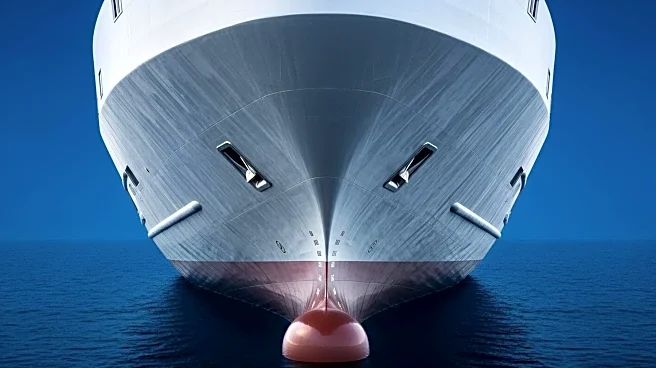What is the story about?
What's Happening?
The global ocean hull insurance market is experiencing a shift towards softer conditions, despite a 3.5% increase in premiums in 2024, totaling $9.67 billion. The International Union of Marine Insurance (IUMI) Ocean Hull Committee Chair, Ilias P. Tsakiris, highlighted that Asia-Pacific accounted for 35% of these premiums, with Europe contributing 53% and other regions 12%. The global fleet value has grown by 4% to $1.54 trillion, increasing market exposure. Claims are under pressure due to machinery failures and incidents involving older ships, with 52% of 2024 incidents involving vessels over 20 years old. The fleet age continues to rise amid low scrapping and limited newbuilding, while alternative-fuel vessels now make up about 25% of newbuild orders, introducing new risk profiles.
Why It's Important?
The rise in ocean hull premiums and fleet value indicates a growing market exposure, which could impact the insurance industry and global shipping operations. The increase in premiums reflects the need for insurers to cover higher risks associated with older vessels and machinery failures. The shift towards alternative-fuel vessels introduces new risk profiles, which insurers must adapt to. Geopolitical tensions are adding costs and delays, affecting global trade and shipping routes. Stakeholders in the shipping and insurance industries must navigate these changes to maintain profitability and operational efficiency.
What's Next?
The industry may see further adjustments in premium rates as insurers assess the risks associated with alternative-fuel vessels and geopolitical tensions. Shipping companies might invest in newer, more efficient vessels to reduce incident rates and insurance costs. The focus on sustainability and alternative fuels could drive innovation in shipbuilding and insurance products. Stakeholders will likely monitor geopolitical developments closely to mitigate potential impacts on shipping operations.
Beyond the Headlines
The shift towards alternative-fuel vessels highlights the industry's move towards sustainability, which could have long-term environmental benefits. The increasing fleet age and low scrapping rates raise concerns about the environmental impact of older vessels. The insurance industry may need to develop new products to address the unique risks associated with alternative fuels and geopolitical tensions.















